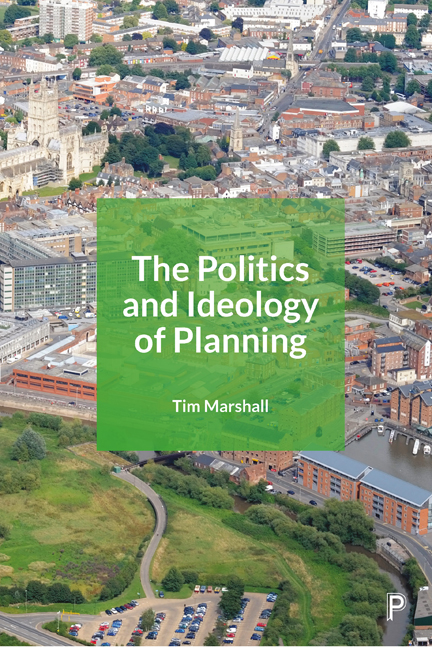Book contents
- Frontmatter
- Contents
- List of figures and tables
- List of abbreviations
- Acknowledgements
- 1 Introducing planning, politics and ideology
- 2 Writing on politics and ideology in planning
- 3 Ideologies in Britain, with initial linking to planning
- 4 Planning history, planning reform and politics and ideology
- 5 Planning expertise and planning law: autonomy from politics and ideology?
- 6 Ideology and politics in government, central and local
- 7 Ideology and politics in professions, lobbying, consultancies and pressure groups
- 8 Communication, the media and deliberation
- 9 Facets of planning action: heritage, local environment and design
- 10 Fields of planning action: housing, economy and infrastructure
- 11 Paths to improving the ideological and political dimensions of planning
- References
- Index
3 - Ideologies in Britain, with initial linking to planning
Published online by Cambridge University Press: 05 January 2022
- Frontmatter
- Contents
- List of figures and tables
- List of abbreviations
- Acknowledgements
- 1 Introducing planning, politics and ideology
- 2 Writing on politics and ideology in planning
- 3 Ideologies in Britain, with initial linking to planning
- 4 Planning history, planning reform and politics and ideology
- 5 Planning expertise and planning law: autonomy from politics and ideology?
- 6 Ideology and politics in government, central and local
- 7 Ideology and politics in professions, lobbying, consultancies and pressure groups
- 8 Communication, the media and deliberation
- 9 Facets of planning action: heritage, local environment and design
- 10 Fields of planning action: housing, economy and infrastructure
- 11 Paths to improving the ideological and political dimensions of planning
- References
- Index
Summary
This chapter explores the main ideologies and their links to planning. It therefore starts to detail the ideology-and-planning connections. Chapter 4 gives a historical overview of Britain's planning development as seen through the conceptual lens used in this book, as well as a more detailed history of one recent government's management of planning reforms.
The primary ideologies in Britain, and initial linking with planning
We now look more carefully at the range of ideologies with influence in Britain, and begin to make connections with how they have affected planning. We have to get to grips with the ‘ideological landscape’ (Berry 2011, p 2), a term which usefully highlights that at any moment there is a spread of ideological influences in play, pressing on day-to-day policy formation, and with relational effects – if one part of the landscape changes, that can have knock-on effects on other parts, over time.
A first decision needed in all surveys of ideologies is which ideologies to cover. Textbooks make varied choices. The massive handbook on political ideologies edited by Freeden, Sargent and Stears (2013) has 20 chapters in the section on specific ideologies, although around half are not on ‘isms’, having a more topic or geographical character. Shorter treatments are likely to limit themselves to the big three of the 20th century, liberalism, conservatism, socialism, plus whatever extra ideologies are seen as key at the moment of writing – communism and fascism in the post-war decades, new movements such as feminism and environmentalism from the 1980s. Freeden (2003) considers the distinction between ‘thick’ and ‘thin’ ideologies. The classic ‘thick’ political ideologies are seen as having a depth which allows some view to be taken across most of the core questions facing societal action, and so governmental policies. These have typically been the motors behind successful and enduring political parties or political regimes. On the other hand, a whole range of movements of ideas, while in many cases developed and influential, are ‘thin’ in that they do not have the capacity to resolve key issues likely to need governmental and party decision: environmentalism is strong on green issues, but Green parties have struggled, at least in many countries, to present themselves as possessing equally coherent positions on, say, the economy or the schools system – or planning, though there a strong dose of environmental prioritisation can go some way to a confident position.
- Type
- Chapter
- Information
- The Politics and Ideology of Planning , pp. 39 - 62Publisher: Bristol University PressPrint publication year: 2020



